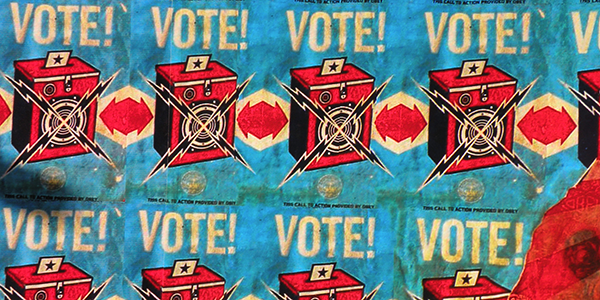Online voting can work, but only if we design systems that voters can have confidence in
Could online voting be used to ensure elections continue during the Covid-19 pandemic? Areeq Chowdhury sets out some key principles of accessibility, security and user experience which should form the basis of any internet voting system if it is to elicit public confidence.

Street Art by Shepard Fairey, San Francisco. Picture: Michael Pittman / (CC BY-SA 2.0) licence
None of us know for certain whether any vote we’ve ever cast in any election was counted. In the absence of being able to physically see a ballot paper proceed through the system to the point when it’s counted on election night, we, instead, rely on trust that the system is working. The simple process of ballot papers entering a metal box and being transported and counted elsewhere is straightforward for us to understand. The number of people involved in the process builds the trust within us that our votes are difficult to corrupt. One question I’ve been considering for the past few years is whether this trust can be replicated in an online system and, if so, what would that look like? My conclusion is that for online voting, more than trust, we need confidence.
As we are reluctantly learning during this global coronavirus pandemic, not being able to leave our homes can limit our capabilities in a number of ways. As a result, we are now constantly seeking digital alternatives to activities which we previously took for granted. Thousands of companies are now working remotely using video conferencing tools and online messaging applications. Shoppers are queuing up online in order to book a grocery delivery. Funerals are being live-streamed. Our democracy, too, is being affected. MPs have started innovating with digital constituency surgeries and there is growing talk of creating an ‘e-Parliament’. Meanwhile, the May local elections have had to be postponed by a year whilst the Labour leadership contest, which was already using online voting, has been able to continue.
Once the pandemic is over, people will, hopefully, return to their lives with a greater appreciation of the value of the internet. This value has already been embedded into many corners of our society, but our method of voting is still fairly similar to the way it was back in the late 1800s. Amongst other factors, what has been holding back the modernisation of our voting system is the lack of agreement over what online voting should look like. How can an online voting system achieve the same goals as a paper-based system when the internet is inherently a ‘black box’?
In 2018, as a contribution towards answering this question, WebRoots Democracy established the ‘Cratos Project’; a research project aiming to design a framework to assess the suitability of remote online voting systems for use in elections. Through a series of forums, roundtables and expert interviews held in Birmingham, Edinburgh and London, we delved into the contentious debates which exist in this niche field and drew out lessons from existing paper-based methods of voting. The result, two years later, is our new report, entitled ‘The Cratos Principles’. The report contains two main outputs. The first are the principles themselves, 33 in total, which cover key aspects of accessibility, security, and user experience. These range from ensuring the voting platform can be used by all to encryption and verification standards. The second is a recommended ratings framework which applies weightings to the different principles based on importance.
If all 33 principles were to be adopted, an online voting system would be secure, trustworthy, user-friendly and accessible. However, this new system of voting may look unrecognisable to the paper-based systems of the past. Novel challenges may open the door to concepts such as repeat voting and necessitate pseudonymous voter identities. Equally, the opportunities enabled by the reform should encourage us to consider new thinking around accessibility, voter experience and election information. Most importantly, trust alone may not be enough, and we may need to explore ideas like verification. If the Cratos Principles were to be adopted for an election, individuals would be able to verify that their votes are within the count using a public ledger, akin to a student checking their exam results on a university noticeboard. In an age of cyber-attacks and disinformation, online voters need to have confidence that their votes are being recorded accurately. They need to know whether or not their vote has been corrupted.
What should result, therefore, is an entirely new system, which has been designed from scratch but incorporates the lessons of decades of paper-based elections. Attempts to merely replicate traditional voting systems risk exacerbating the very real flaws within paper-based voting such as the lack of identification, the inability to verify whether votes have been counted accurately, and the barriers to independent voting for those with severe disabilities. The aim with online voting should be to go beyond what came before and to design something that doesn’t require trust.
For those who are old-hands in the field, these concepts may be nothing new. For those, however, who are approaching online voting for the first time, or those willing to look anew at the subject, the Cratos Principles are there to serve as a tool in the design and assessment of new online voting systems. The principles have been shaped by expert insights from those in industry and academia and aim to provide clarity in a field which has been clouded in debate. Online voting is the future and is certainly not impossible, but for it to be probable we must think beyond the ballot box and conjure up something better than that which came before.
This article gives the views of the author, and not the position of Democratic Audit. You can download the new report, The Cratos Principles, here.
About the author

Areeq Chowdhury is the founder of WebRoots Democracy and the author of The Cratos Principles.





 Democratic Audit's core funding is provided by the Joseph Rowntree Charitable Trust. Additional funding is provided by the London School of Economics.
Democratic Audit's core funding is provided by the Joseph Rowntree Charitable Trust. Additional funding is provided by the London School of Economics.